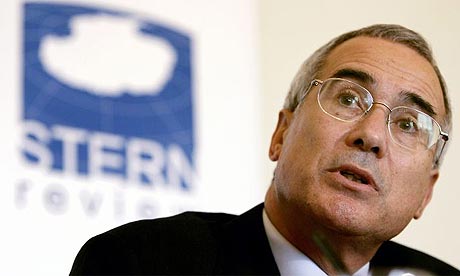
Sir Nicholas Stern's review last year warned of the economic and social costs of climate change. Photograph: Alastair Grant/AP
Sir Nicholas Stern, the government adviser on the economics of climate change and development, has urged nations to agree on ambitious reductions in greenhouse gas emissions or face the "destructive" consequences of global warming.
Writing in today's Guardian, Stern, who produced a high-profile review of the economics of climate change last year, says rich countries must show leadership at a UN conference in Bali next week and aim for 80% cuts in their own pollution by 2050. The meeting will aim to agree the scope and timescale of a treaty to replace the Kyoto protocol when it expires in 2012.
Stern writes: "Ambitious targets for emissions reduction must be at the heart of that agreement, together with effective market mechanisms that encourage emission trading between countries, rich and poor. The problem of climate change involves a fundamental failure of markets: those who damage others by emitting greenhouse gases generally do not pay.
"We risk damages on a scale larger than the two world wars of the past century. The problem is global and the response must be a collaboration on a global scale."
Stern says the response must pay more attention to the issue of equity. "Our starting point is deeply inequitable, with poor countries certain to be hit earliest and hardest by climate change."
The average emissions a head must fall from seven tonnes to two to three tonnes of carbon dioxide a year by 2050, he says. US emissions a head are more than 20 tonnes each year, with European citizens producing 10-15 tonnes each. In China it is about five tonnes, in India about one, and in Africa less than one tonne each.
Stern says the rich countries also need to provide public funding for three more key elements of a global deal: to combat deforestation, develop technology such as carbon capture and storage, and to help poor and vulnerable regions adapt to the consequences of climate change.
British officials do not expect the conference to produce a significant breakthrough, but they hope countries will agree general principles and set the ground for detailed talks over the next two to three years. Observers say a treaty needs to be finished by 2009-10 to follow Kyoto and allow carbon markets to develop.
Separately, business leaders from 150 global companies will today call for mandatory cuts in carbon to be agreed at Bali. The initiative, led by the Prince of Wales, argues that a "sufficiently ambitious, international and comprehensive legally binding UN agreement to reduce greenhouse gas emissions will provide business with the certainty it needs to scale up global investment in low-carbon technologies."
The group includes Chinese companies such as Shanghai Electric and Suntech, as well as US firms including Nike, Coca-Cola, Gap and Sun Microsystems.

No comments:
Post a Comment